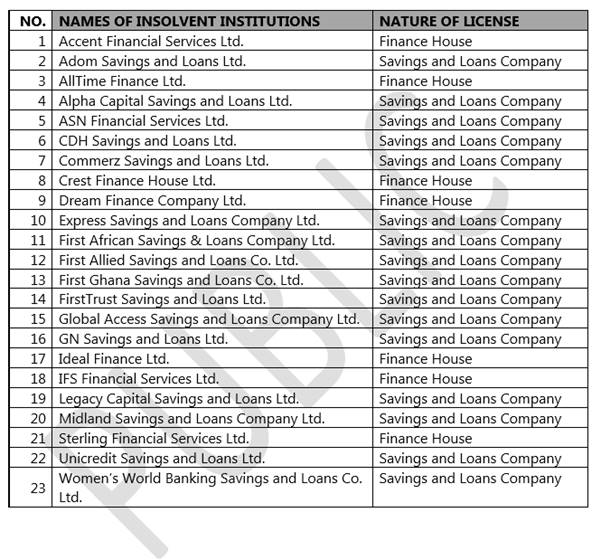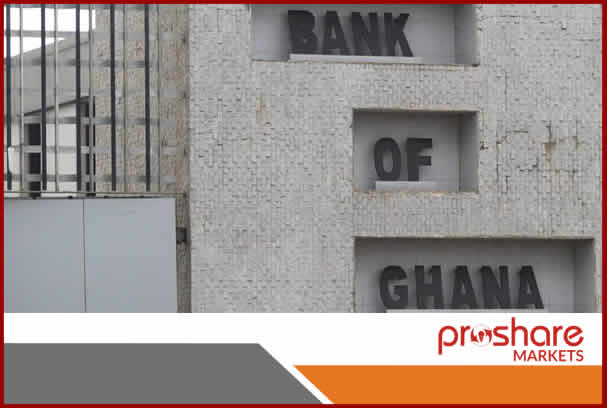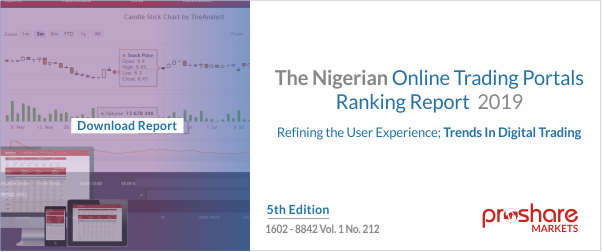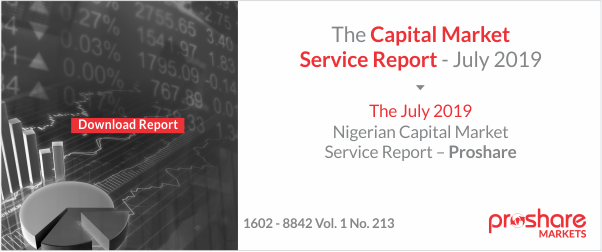Friday,August 16, 2019 /09:35PM / By Bank of Ghana / Header ImageCredit: Gh Gossip
TheBank of Ghana has, with effect from today, revoked the licences of twenty-three(23) insolvent savings and loans companies and finance house companies (seeAnnex 1). These actions were taken pursuant to Section 123 (1) of the Banks andSpecialised Deposit-Taking Institutions Act, 2016 (Act 930), which requires theBank of Ghana to revoke the licence of a Bank or Specialised Deposit-TakingInstitution (SDI) where the Bank of Ghana determines that the institution isinsolvent. The Bank of Ghana has also appointed Mr. Eric Nipah as a Receiverfor the specified institutions in line with section 123 (2) of Act 930.
Therevocation of the licences of these institutions has become necessary becausethey are insolvent even after a reasonable period within which the Bank ofGhana has engaged with them in the hope that they would be recapitalized bytheir shareholders to return them to solvency. It is the Bank of Ghana’sassessment that these institutions have no reasonable prospects of recovery,and that their continued existence poses severe risks to the stability of thefinancial system and to the interests of their depositors.
Inline with the Government’s commitment to protect depositors’ funds, theGovernment has made funds available to enable the Receiver pay depositors aftertheir claims are validated. The Receiver will in due course make anannouncement with regards to when and where payments will be made. The Receiverwill also indicate documents required from depositors to facilitate thevalidation of claims and orderly payment of validated deposits. Other creditorsof the failed institutions will be settled by the Receiver upon validation oftheir claims and to the extent that the Receiver is able to realise value fromthe remaining assets of these institutions.
TheBank of Ghana has also with effect from today, revoked the licences of two non-bank financial institutions, namely Express Funds International Ltd (remittancecompany) and Ghana Leasing Company Ltd (leasing company) which are insolventand have been inactive for a number of years. This action is pursuant toSection 7 of the Non-Bank Financial Institutions Act, 2008 (Act 774), whichmandates the Bank of Ghana to revoke the licence of a non-bank financialinstitution licensed under that Act if that institution among other thingsceases to carry on business. The Bank of Ghana has notified the Registrar ofCompanies of the revocation of these two licences and has requested that theRegistrar commences winding-up proceedings against these companies under theBodies Corporate (Official Liquidations) Act, 1963 (Act 180).
Background
Aspart of its efforts to restore confidence in the banking and specializeddeposit-taking sectors, the Bank of Ghana embarked on a clean-up exercise inAugust 2017 to resolve insolvent financial institutions whose continuedexistence posed risks to the interest of depositors.
Acomprehensive assessment of the savings and loans and finance house sub-sectorscarried out by the Bank of Ghana in the last few years, identified seriouschallenges (see Annex 2), summarized as follows:
a. The levels of capital held by some savings and loans companies and financehouse companies were in violation of the minimum regulatory capital required byAct 930. This made it precarious for these institutions to continue toundertake the business of specialised deposit-taking institutions, given therisks they posed to their depositors and other counterparties to whom they wereexposed directly or indirectly;
b. Excessive risk-taking without the required risk management function to managerisk exposures;
c. The use of depositors’ funds to finance personal or related-party projects orbusinesses on terms that were not commercial, leading to little or no incomeaccruing to the relevant savings and loans companies or finance house companiesand thereby compounding their liquidity challenges;
d. Corporate governance weaknesses with weak Board oversight, poor accountability,and override of internal controls;
e. Creative accounting practices and under-provisioning for impaired assets,thereby misrepresenting their true financial condition to the Bank of Ghana andother stakeholders; and
f. Persistent regulatory breaches, involving non-compliance with Bank of Ghana’sprudential rules, and failure to implement Bank of Ghana on-site examinationrecommendations.
Allefforts by the Bank of Ghana to get the shareholders and directors of theaffected institutions to rectify the above lapses, especially the significantcapital deficiencies, yielded no positive results. Consequently, the financialposition of these institutions has continued to deteriorate, leading to theirinsolvency with some of them ceasing operations and closing their offices todepositors whiles those currently in operation are unable to pay depositors andother creditors at all or fully.
Giventhe risks that these institutions continue to pose to the entire financialsystem and the need to protect the interest of depositors, the Bank of Ghana issanitizing this sub- sector through the orderly resolution of the failedinstitutions in accordance with Sections 123 to 137 of Act 930.
TheBank of Ghana has with effect from today, completed the clean-up of thebanking, specialized deposit-taking (SDI), and non-bank financial institutions(NBFI) sectors which began in August 2017. This follows the revocation of thelicences of nine (9) universal banks, 347 microfinance companies (of which 155had
alreadyceased operations), 39 micro credit companies/money lenders (10 of which hadalready ceased operations), 15 savings and loans companies, eight (8) financehouse companies, and two (2) non-bank financial institutions that had alreadyceased operations.
TheBank of Ghana is committed to ensuring that the banking, SDI, and NBFI sectorsremain resilient, inclusive, and supportive of Ghana’s economic growthtrajectory. To ensure that the remaining institutions remain resilient goingforward, the Bank of Ghana will remain vigilant, intensify on-site examinationsand enforcement actions including the application of sanctions fornon-compliance with statutory, prudential and other requirements, and ensurethat early warning signs of distress are mitigated by regulated institutionsexpeditiously. The Bank of Ghana will also work with ARB Apex Bank toreposition the rural and community banking sector, to enable them to bettersupport rural economic development. Furthermore, the Bank of Ghana and theGovernment of Ghana will also launch the commencement of operations of theGhana Deposit Protection Scheme in September 2019 to further strengthenprotection of depositors’ interests.
List Of Twenty-Three (23) Insolvent Institutions Whose Licences HaveBeen Revoked

Related News
1. Bank of Ghana Collapses Five Banks into Consolidated BankGhana Ltd
2. CBN revokeslicences of 236 Operating Bureaux de Change
3. NSE revokeslicences of 10 brokerage firms over malpractices; 48 declared inactive
4. CBN RevokesLicences of 14 Banks
5. Namibian MPCdelivers Rate Cut Though Bolder Policies remain at Large
6. Economic Reformsin Egypt and Slowing inflation, What Next for the Central Bank?
7. New US-ChinaTariffs A Further Risk To Global Growth
8. A Week toRemember, As The Fed Delivers on Rate Cut
9. South Africa andNigeria: A Similar Narrative
10. IMF Sees Weaker Growthfor the Global Economy; while ECB Holds Rate
11. SSA EquityMarket Outlook: At the Mercy of New Reforms
 Lagos, NG • GMT +1
Lagos, NG • GMT +1











 1482 views
1482 views








 Sponsored Ad
Sponsored Ad
 Advertise with Us
Advertise with Us









